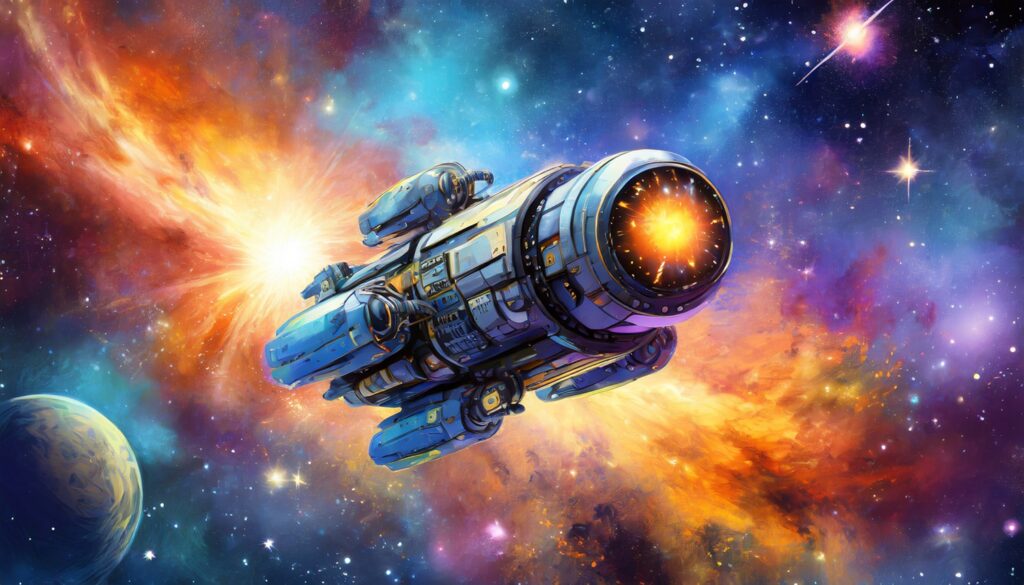
“Space: the final frontier,” a phrase that echoes from the classic voyages of Star Trek, has always ignited the imaginations of dreamers and innovators. Picture this: intelligent machines that were once the realm of sci-fi fantasies are now real-life pioneers, charting the cosmic sea in search of starry explosions that light up the universe. These explosions are called supernovas, and they’re not just spectacular light shows; they’re crucial to understanding our place among the stars.
Let’s embark on an interstellar adventure to discover how Artificial Intelligence (AI)—the same technology that gives us smart cars and virtual assistants—is now helping us unlock the secrets of the cosmos.
Explaining the Supernova Spectacle:
To appreciate the role of AI in astronomy, we must first explore the life and death of stars. Supernovas are cosmic events of epic proportions. They occur when stars, much like actors, take their final bow in a performance that outshines entire galaxies. When a star has exhausted its nuclear fuel, it may explode and become a supernova, radiating more energy in a few months than our Sun will emit in its entire lifetime.
Why Hunt for Supernovas?
The quest to find supernovas is not just about witnessing these magnificent bursts. Supernovas are cosmic forges where elements heavier than iron are created. Every atom of gold or silver jewelry, every bit of iron in our skyscrapers, and even the calcium in our bones were formed in the fiery bellies of stars and scattered across space by these stellar explosions. Supernovas help us understand the universe’s expansion and serve as lighthouses for navigating the vastness of space. In a way, by studying them, we’re piecing together the story of our own origins.
Enter the AI Astronauts:
Now, imagine the power of AI, with its endless capacity for memory and analysis, joining this celestial hunt. AI systems, like the groundbreaking Bright Transient Survey Bot (BTSbot), are the new astronauts in this adventure. These digital detectives scan the skies tirelessly, sifting through the twinkling of a billion stars to spot the rare brilliance of a supernova.
How AI like BTSbot and Its Kin Find Supernovas:
BTSbot represents a leap in technology akin to the difference between sending messages via carrier pigeons and instant messaging across the globe. By comparing countless images of the night sky over time, BTSbot notices changes—new dots of light that signal a supernova. It’s like playing the ultimate game of “spot the difference,” one that could take human astronomers years, but AI does in mere moments.
Upon detecting a potential supernova, BTSbot doesn’t jump to conclusions. It calls upon a telescope equipped with the Spectral Energy Distribution (SED) Machine to capture a spectrum. This spectrum acts like a fingerprint, unique to each supernova, telling us the story of what happened millions or even billions of years ago.
The AI Supernova Hunter’s Triumph:
The proof is in the cosmic pudding: BTSbot has already successfully spotted its first supernova, named SN2023tyk. This Type Ia supernova, a particular kind of stellar explosion, provides critical clues about the death of white dwarf stars and the expansion rate of our universe.
Beyond Supernovas:
The Search for Alien Life: While supernovas are a primary target, the sophisticated algorithms driving AI like BTSbot could potentially lead us to other discoveries, including signs of extraterrestrial life. By monitoring the heavens continuously and recognizing patterns beyond human capability, AI may one day detect the faint signal of an alien civilization or identify a planet with life-sustaining potential.
Inspiring the Next Generation:
The future of space exploration and discovery is not just in the hands of robots; it’s also in the minds of young visionaries like you. Through innovative learning platforms like Camp Integem, you can dive into the world of AI and space. You’ll learn not only about the technology but how to harness it for your own creative pursuits.
Crafting New Realms with AI:
Camp Integem offers more than just lessons; it’s a launchpad for your imagination. Here, you become the architect of virtual universes, the commander of space missions, and perhaps the inventor of the next AI astronaut. Your ideas could lead to new ways of exploring the unknown and contribute to the next monumental space discovery.
Conclusion:
So, dear explorers, as we stand on the cusp of this new era, remember that every glance at the night sky holds a story waiting to be told. Each star is a sun, each sun may host worlds, and on one of those worlds, there may be someone looking back at us. With AI as our co-pilot in this cosmic journey, the possibilities are as limitless as the universe itself.
Gear up, charge your imaginations, and set course for the stars with the power of AI. Remember, in this quest for knowledge, the sky is not the limit; it’s just the beginning of a thrilling expedition into the vast ocean of the cosmos.

